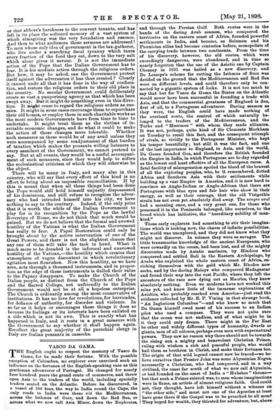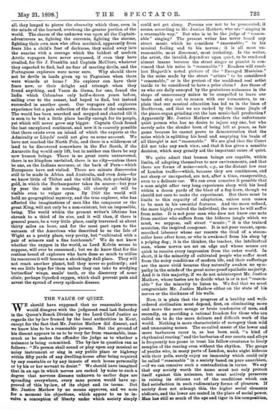VASCO DA GAZA.
THE English ought to respect the memory of Vasco da Gama, for he made their fortune. With the possible exception of Columbus, no explorer ever exercised such an influence on the fortunes of the English-speaking race as this gentleman adventurer of Portugal. He changed for nearly four hundred years the grand route of commerce, and threw open Asia to the traders of the world, including specially traders seated on the Atlantic. Before he discovered, in a vessel of 160 tons, the way to India round the Cape, the only roads to India were those yid the Mediterranean, across the Isthmus of Suez, and down the Red Sea, or across what we now call Asia Minor, down the Euphrates, and through the Persian Gulf. Both routes were in the hands of the daring Arab seamen, who conquered the territories on the eastern coast of Africa, founded powerful
settlements in India, and became, as Solomon and his Phoenician allies had become centuries before, monopolists of the carrying trade between two continents. From the time
of his discovery, however, the old routes, which were exceedingly dangerous, were abandoned, and in time so
nearly forgotten that the use of the Asiatic one by Captain Chesney in 1831 was hailed as a new discovery, and De Lesseps's scheme for cutting the Isthmus of Suez was derided on the ground that the Mediterranean and Red Sea were on different levels, and could therefore only be con- nected by a gigantic system of locks. It is not too much to
say that but for Vasco da Gama the States on the Atlantic would never have been successful in founding a trade with Asia, and that the commercial greatness of England is due, first of all, to a Portuguese adventurer. Daring seamen as they were, the English could have made nothing of the overland route, the control of which naturally be- longed to the traders of the Mediterranean, and the Turks and " Moormen " with whom they made alliances. It was not, perhaps, quite kind of Sir Clements Markham on Tuesday to recall this fact, and the consequent triumph of rivals, so vividly to the Portuguese Minister, who kept his temper beautifully; but still it was the fact, and one of the last importance to England, to Asia, and the world. Da Gama founded Goa, and therefore the British founded the Empire in India, in which Portuguese are to-day regarded as the lowest and least effective of all the European races. A fatal facility of miscegenation spoiled the blood of the bravest of all the exploring peoples, who, be it remembered, dotted Africa and Southern Asia with their settlements while building up a vast Empire in America, and it is now hard to convince an Anglo-Indian or Anglo-African that there are Portuguese with blue eyes and fair hair who show in their energy, as well as their courage, that the old Visigothic strain has not even yet absolutely died away. The sangre azul had a meaning once, and a very great one, for those who possessed it in the Peninsula belonged, like ourselves, to the breed which has initiative, the "hereditary nobility of man- kind."
These early explorers had something to stir their imagina- tions which is lacking now, the charm of infinite possibilities. The world was unexplored, and they did not know what they might not discover. In science they were as savages. The little transmarine knowledge of the ancient Europeans, who were cowardly on the ocean, had been lost, and of the mighty discoveries made by Asiatic mariners, by Hindoos who conquered and settled Bali in the Eastern Archipelago, by Arabs who exploited the whole eastern coast of Africa, en- riching themselves with the gold which Mr. Rhodes now seeks, and by the daring Malays who conquered Madagascar and found their way into the vast Pacific, where they left the ancestors of the race now dying oat as Maories, they knew absolutely nothing. Even we moderns have not worked this mine yet, and know little of the immense explorations of Asiatics, who probably reached even America—just read the evidence collected by Mr. E. P. Vining in that strange book, " An Inglorious Columbus "—and who knew so much that Da Gama himself owed most of his success to an Indian pilot who used a compass. They were not quite sure that the ocean was not endless, and of what might be in it they could only dream. There might in the Far East be other and widely different types of humanity, dwarfs or giants, men of all colours, perhaps even men with supernatural powers. They saw no reason why there should not be towards the rising sun a mighty and benevolent Christian Prince, ruling with wisdom a rich and peaceful people, who would hail them as brethren in Christ, and make their fortunes too. The origin of that wild legend cannot now be traced—we be- lieve ourselves that Prester John was some Abyssinian Negras, necessarily a Christian, who had conquered, and in a way civilised, the coast far south of what we now call Abyssinia, or had founded on the coast of India a " Hubshee " throne— but that such a Prince existed was, to men whose imaginations were in flame, an article of almost religions faith. God could not, they thought, have left himself without a witness on "the other side," and must not one of the Apostles at least have gone there if the Gospel was to be preached to all men? They hoped for wealth, they thirsted for adventure, but, above
all, they longed to pierce the obscurity which then, even in the minds of the learned, overhung the greater portion of the world. The charm of the unknown was upon all the Captain- adventurers as, fighting the currents, fighting the storms, fighting their own men who often mutinied, apparently from fears like a child's fear of darkness, they sailed away into the sunrise with a courage which the boldest of modern Arctic voyagers have never surpassed, if even they have rivalled, for Sir J. Franklin and Captain McClure, whatever they expected to find, had no fear of meeting devils, and the Portuguese explorers were never sure. Why should there not be devils in lands given up to Paganism when there were wizards at home P No explorer can have their fears now, or their delight and triumph when they found anything, and Vasco da Gama, for one, found the India which Columbus only half-a-dozen years before, sailing ever to the sunset, had hoped to find, but instead succeeded in another quest. Our voyagers and explorers experience but a pale reflection of the charm of the unknown. The world has been searched and mapped and charted till it is seen to be but a little place hardly enough for its people, yet which will never grow any bigger. Captain Cook found the last unexplored continent, and now it is scarcely possible that there exists even an island of which the experts at the Admiralty or Lloyds' could not give us some account. We have not reached the North Pole, and there is a wilderness of land to be discovered somewhere in the Far South, if the Antarctic fog would only lift, but in neither can there be any new human beings. There is no great route untravereed, there is no kingdom unvisited, there is no city—unless there be one, as the Indians murmur, at the back of Peru—which Europeans have not visited. There are minute discoveries still to be made in Africa and Australia, and even Asia—for we know little of Thibet and the wild hills, rich probably in gold, in which the Burhampooter takes its source—but year by year the mist is receding, till shortly all will be visible even to vulgar eyes. By 1950 the world will hold no geographical mystery, and the true explorer, who has affected the imaginations of men like the conqueror or the great King, will not only be a non-existent, but an impossible, being. The world within the present writer's lifetime has shrank to a third of its size, and it will then, if there is general peace, be a very little place, easily traversed at about thirty miles an hour, and for the most part open to the sarcasm of the American who described to us the Isle of Wight as a pretty place, very pretty, but "cultivated with a pair of scissors and a fine toothcomb." We do not know whether the oxygen in the world, as Lord Kelvin seems to suppose, will ever be consumed ; but we do know that for the restless brood of explorers who have done so much to utilise its resources it will become a shockingly dull place. They will not reach another planet, toil they never so patiently ; and we see little hope for them unless they can take to studying butterflies' wings, snails' teeth, or the discovery of some elixir, perhaps liquefied oxygen, which shall prevent pain and arrest the spread of every epidemic disease.



































 Previous page
Previous page